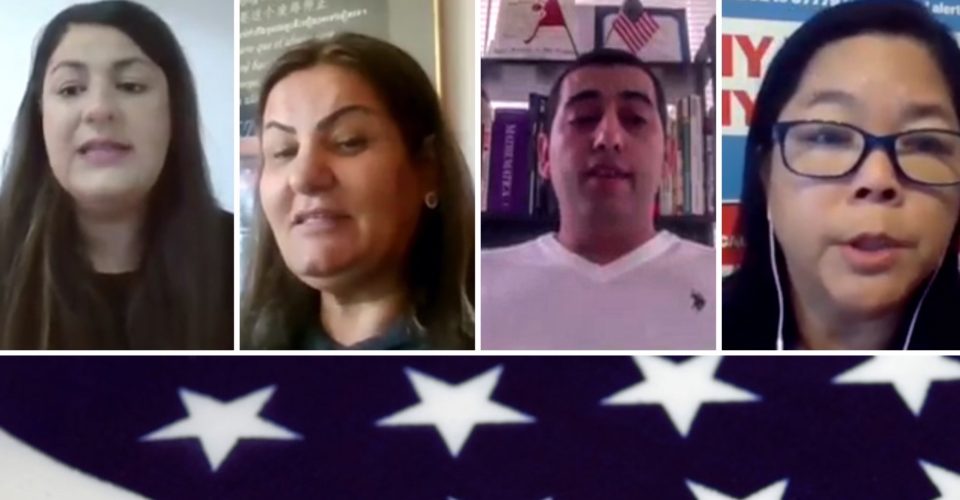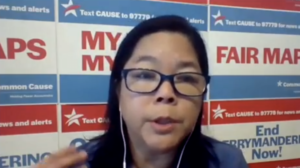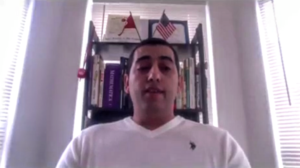“Our communities continue to grow and we need resources,” said Chakib Ayadi, executive board member and founder of the Tunisian American Foundation.
By BARAA ALKASSIR
EL NUEVO SOL
To raise awareness about the urgency and importance of designating a separate category for the MENA population on the census, Ethnic Media Services along with California Middle Eastern & North African (MENA) leaders and advocates held a virtual zoom panel this Wednesday to raise questions about the lack of MENA representation in the 2020 census.
Ethnic Media Services, a San Francisco based company that “works to enhance the capacity of ethnic news outlets…with the goal of building a more inclusive participatory democracy” hosted the panel that included ten experts who come from different ethnic and professional backgrounds.
The panelists discussed their individual struggles and organizational efforts related to the census as well as raised concerns about the legitimacy of the questions that the census uses to collect data.
Are MENA people simply white or non-Hispanic white? Or are they just not significant enough to designate a box for them on the 2020 census?
These questions have confronted the MENA population for decades as they have been forced to identify as other racial groups every decennial census.
Currently most of those who identify as a part of the MENA population either check the white or Asian box on the census form. And although some groups within the MENA population, like Egyptians and Lebanese, are legally counted on the census as Caucasian, they don’t benefit from many of the perks that come with belonging to the ‘white’ racial group in America. This inequality is especially evident in a rich state like California because these two racial groups live in different districts.
“This struggle dates back to a history that is over a hundred years old,” said Loubna Qutami, president’s postdoctoral fellow at UC Berkeley. “The 1790 census was the first census and it coincided at that time with the 1790 naturalization act which reserved the eligibility for citizenship to free white persons.”
Qutami also explained that although the census initially disempowered minorities, it eventually evolved into a tool for social justice following the civil rights movement that occurred during the 1960s. The Census has since become a way for minorities to show their presence and demand their right to federal resources.
Without proving their true count and showing their demographic numbers, however, a lot of different ethnic groups within the broader MENA community are left unable to secure the federal dollars they need to maintain and improve their growing communities and neighborhoods.
“Our communities continue to grow and we need resources,” said Chakib Ayadi, executive board member and founder of the Tunisian American Foundation. “The data shows that our Tunisian community here in the Bay Area is growing fast. The number of Tunisians in the USA has grown by 0.85 percent in the 2019-2020 year.”
Ayadi further explained that these numbers are mere estimates because there are no official numbers recorded by the government that can be relied on. This, in turn, renders people like Ayadi and their small but vibrant and quickly growing communities practically invisible to the system, which means that their community needs are neglected.
This seems to be the case for a concerning number of minority groups living within the United States. Take the Kurdish-Iraqi population in the city of El Cajon located in San Diego County for example.
According to Dilkhwaz Ahmed, executive director of non-profit “License to Freedom” and one of the panelists who lives in El Cajon there are over 35 thousand Kurdish-Iraqi residents out of 103,241 total residents in the city but according to the county data, the Kurdish-Iraqi population only comprises eight percent of the total residents living in El Cajon.
During the redistricting of the city districts, which relies on census numbers, the Kurdish-Iraqi and Afghan communities went to the city and were lining inside and outside the city council to advocate for selective mapping that would benefit their communities however because the city is as Ahmed phrased it “is run by white people” the advocates were denied.
“The schools around the city, the school board… they are all white people,” said Ahmed. “We have a lot issues of discrimination and racism, especially when the Syrian refugee community arrived. There were issues of bullying and the school they don’t want to adopt an anti-bullying policy. Why? Because we don’t have a representative there, so nobody can advocate.”
There is an evident concern by MENA leaders and other anti-gerrymandering activists like Kathy Feng, the national redistricting director of the nonpartisan watchdog group Common Cause, about the inequality that results from an inaccurate census.
Feng explained during her time on the panel that when the same ethnic community is divided into different districts it becomes hard for that ethnic group to voice it’s community needs and grievances because there are not enough voters that care about the same issues in the district.
“This really demonstrates the importance of why communities really need to get involved in redistricting,” said Feng. “You could be split into four different pieces or you could be held whole.”
Feng had the same experience during her former years with the Korean community living in downtown Los Angeles.
“Time and time again residents came to the legislatures and said we would like not to be split into four districts,” said Feng. “But it just so happened that there was a very valuable piece of real estate along Wilshire corridor and every politician wanted a piece of that because they wanted the business development that comes from that,” she added.
But since 2011 there has been a national movement toward changing way redistricting happens. Traditionally it happened through legislatures that have been replaced with redistricting citizen’s commissions that are chosen through a lottery process to eliminate any bias and promote the chances of diversity.
The power is shifting and MENA leaders understand that the 2020 census plays a bigger role in our society than just counting how many people live in a given geographical area. It is a powerful means for ethnic representation and it is the single most important source when it comes to allocating federal resources to districts around the nation.
“The government officials need to see us. Because we all need to be counted and categorized. And responding to the census is not only our civic duty but it also affects the amount of funding our community receives and how our community plans for the future,” said Ayadi.
Tags: Baraa Alkassir Chakib Ayadi Dilkhwaz Ahmed Kathy Feng Loubna Qutami MENA Middle Easterners & North Africans
















